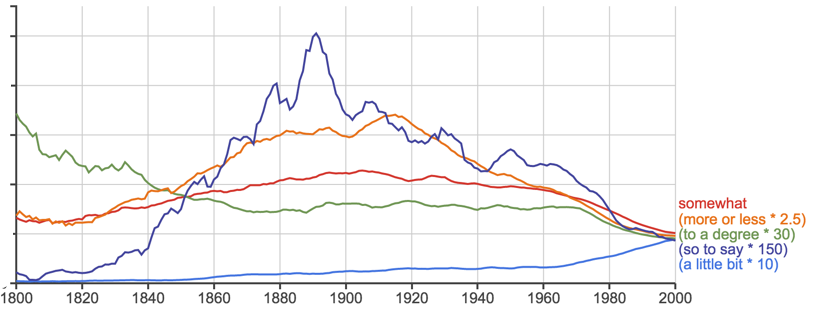A little bit disingenuous
« previous post | next post »
[TRIGGER WARNING: Harsh Quantitative Evaluation of a Facile Generalization]
Todd Gitlin, "You Are Here to Be Disturbed", Chronicle of Higher Education 5/11/2015:
Here's a Google Books ngram frequency plot for "a little bit" along with a selection of other weasel-words, with counts multiplied so as to end up in the same visual range:
As Ben Zimmer suggested (P.C.), "I'm amazed he could think a rise in 'a little bit' is somehow indicative of some big social trend (rather than, say, an increase in printed colloquial usage in the '60s)."
I'll leave Mr. Gitlin's next paragraph as an exercise for the reader:
We talk readily about "comfort zones." The term does not seem to have been used much before the 1990s. A Google Ngram search for "comfort zone" shows a tenfold increase from 1965 to 1996 (with a slight downturn over the following four years). Another Ngram shows that the word "comfortable" slid from 1916 to 1964, then started rising at a rate considerably greater than the earlier slide, almost doubling from 1964 to 2000. Maybe "a little bit" and "comfort zone" soared in the 60s because rising hostilities in American life called forth a spate of euphemisms to muffle the noise. Maybe a lot of Americans didn’t discover they wanted a "comfort zone" until they were radically discomfited.

Ralph Hickok said,
May 16, 2015 @ 12:30 pm
Didn't the phrase "comfort zone" originate from the advertising for a heating and/or air conditioning system? I have a vague recollection to that effect. If so, of course its use would have increased as the advertising became familiar to people.
K. Chang said,
May 16, 2015 @ 1:37 pm
@Ralph Hickok — Wikipedia says you're referring to the "thermal (comfort) zone", but there's also a psychological comfort zone which is what most people refer to. I can't seem to find which term predated the other.
Breffni said,
May 16, 2015 @ 2:23 pm
I looked into the history of 'comfort zone' recently and came away with the impression that the psychological sense was a metaphor based on the climate-control sense, which I hadn't been aware of.
I'm not sure I know what Gitlin is trying to get at with the 'comfort zone' example anyway. People might well "talk readily" about them, but only to advocate getting out of them, not getting in. Even Google won't tell you "how to get back in your comfort zone": the first page of hits is stuff like "Your comfort zone is killing your success", and "Don't walk… run out of your comfort zone".
Karl Weber said,
May 16, 2015 @ 2:38 pm
I'm tempted to draw the opposite conclusion about the rise in popularity of "comfort zone." I have the strong impression that the phrase is used mainly in discussions of why it is BAD to feel too comfortable in life or work, accompanied by exhortations to "get out of your comfort zone" (e.g. by taking risks, tackling new challenges, etc.).
Keith M Ellis said,
May 16, 2015 @ 3:26 pm
Lord, that is an execrable essay.
maidhc said,
May 16, 2015 @ 6:31 pm
"Comfort food" is another term that picked up in the 1990s. There wasn't really a need for it until things like healthy and organic food or ethnic food came into the public consciousness. Comfort food is what you eat when you're upset about something. It makes you feel better because it's like what your mother made for you when you were a child. It's not necessarily unhealthy. It could be meatloaf and mashed potatoes, but also it could be ice cream and pie. It's food that puts you back in your comfort zone when you get too far out of it.
Advertisers haven't picked up on that term very much. They usually prefer "hearty", a word that for me has been used so much that it has completely lost whatever meaning it once had.
There's also "Goldilocks zone", which usually refers to the distance range between a star and its planet that would be suitable for life to occur. (Basically, that there could be liquid water on the surface.)
Rubrick said,
May 17, 2015 @ 2:30 am
I'm rather fascinated by what appears to be the Great Weasel-Word Convergence of 2000.
Eric P Smith said,
May 17, 2015 @ 8:26 am
@Rubrick: That's an illusion. Mark explains that the graphs have been multiplied by different scaling constants so as to end up close to each other.
Haamu said,
May 17, 2015 @ 9:21 am
"Harsh Quantitative Evaluation"? One measly graph and an exercise for the reader? I must say, I'm a little bit disappointed (by which I mean exactly that).
Chris C. said,
May 17, 2015 @ 4:47 pm
Because there were no hostilities in American life before the 1960s. Yeah, right.
D.O. said,
May 17, 2015 @ 10:48 pm
FWIW (very little), combined forces of "you are wrong" and "you're wrong" in G n-grams are at all times high.
Drifter said,
May 18, 2015 @ 12:45 pm
To me, less striking than "uncomfortable" as a weasel word for disagreeing is to "have concerns". "If you have concerns…." has become ubiquitous in the workplace. And as a Google ngram shows, it has come out of nowhere since 1980.
JB said,
May 19, 2015 @ 8:50 am
Is it supposed to be a bad thing that we don't just walk up to each other and say "You disgust me"? Do we need more fist-fights in academia or something?
LilyC said,
May 27, 2015 @ 8:45 am
Perhaps this anxiety about comfort could be related to the fact that speech softeners, like uptalk, are generally associated with feminine speech? It puts me in mind of many other cases in which aging academics argue that things are not as "hard" as they used to or ought to be…